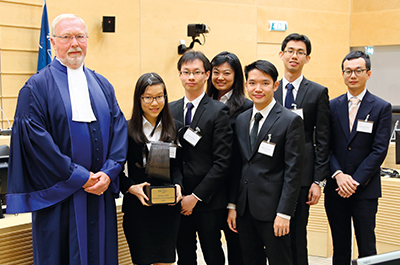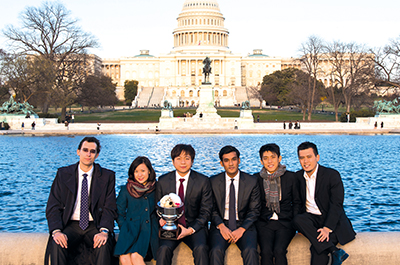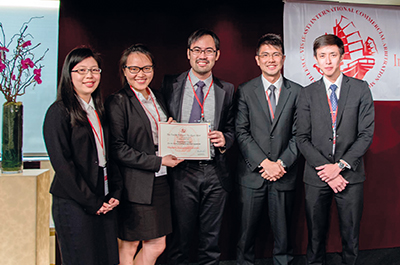
|
NEWS |
Some Thoughts on a Record-breaking 2014/15 Season for Singapore’s International Mooters
Singapore’s Tradition of Excellence in Mooting
Singapore has an extremely proud tradition in international moot court competitions. The famous NUS’82 team which won Singapore’s first Jessup championship comprised members who have all gone on to become Senior Counsel; one is now a High Court Judge (Steven Chong) and another, the Attorney-General (VK Rajah). Videos of championship finals featuring Singapore mooters continue to be used as training tools by universities all over the world, especially the 2001 Jessup final featuring the first and only person to have ever won the two largest moots, the Jessup and the Vis. And in that same year (2001), NUS won arguably the greatest grand slam of titles in a single moot season by bringing home the Asia Cup, Lachs, Maritime, and Jessup championships.
2014/15: Another Historical Milestone, Another Grand Slam
Not many know this yet, but 2014/15 (August 2014 to July 2015) has been yet another historical season for Singapore in international moots. NUS and SMU reached a total of 13 international moot finals, winning 10; the two schools also split eight Best Oralist prizes between them in the process. These are surely records in the annals of international moots, notwithstanding the fact that Singapore is one of the smallest jurisdictions around with only two law schools – and SMU’s first batch of law students only graduated in 2011, 50 years after the first NUS batch did.
Indeed, SMU’s International Moots Program was launched just five years ago in 2010, but the school has since amassed 13 international championships in 26 finals. In the 2014/15 season alone, SMU won five (Vis East, International Criminal Court, Asia Cup, LawAsia, Hague Convention) of the eight finals it reached (the other three being Vis, Price, and Frankfurt), and these feats are surely records too. It may be said of course that SMU truly came under the international spotlight when it became the youngest ever law school to reach the Jessup championship final in 2013 – it would reach the final again in 2014 – and this year, it won the national round for the third year running.
A Changing Landscape in International Moots: Competitiveness Like Never Before
Succeeding in international moot competitions, however, is becoming much more difficult than before. The Jessup moot, for instance, now features more than 600 teams, which is twice the size of the 2001 field (the last time Singapore won the moot). Even newer moots such as the Price and International Criminal Court competitions, which used to attract only a dozen schools when they started in 2008, now attract more than a hundred teams, ranging from young law schools to extremely established ones. What has contributed to this explosion in numbers?
For a start, moot court is now taken much more seriously in many law schools, complete with proper teaching programmes and course credits. The digitisation of knowledge has also eliminated research barriers, and with many teams now being heavily supported and funded by firms and institutions, three important changes have taken place, drastically altering the competitive landscape for international moots: an increase in the number of team members in each team; an increase in the number of competitions a school can participate in; and repeat participation being the norm. One example with respect to the third change is the Sydney team which won a record fourth Jessup championship earlier this year – each member had taken part in quite a number of moots before, and the difference in standard was obvious. Without exception, one simply gets better with practice and feedback, and there is no substitute for competitive experience.
Why We Do What We Do: To be the Best in the World
So why keep trying to compete if the odds are increasingly stacked against us? From a teacher’s point of view, there is no greater joy in witnessing the growth of your students, be it in the personal or professional sense. Many great mooters did not arrive at law school as great orators or with the best grades. But they possessed a tremendous willingness to learn, and it was up to their teachers to bring the best out of them. So for a teacher, it is always gratifying to see your students grow in confidence and self-belief as they develop, and comforting to know that they will be in the best possible position in terms of the skill sets they can offer to firms when they apply for work and in terms of the many different opportunities that may come their way because of their mooting backgrounds.
From an institution’s point of view, despite the great changes to the competitive landscape, SMU remains committed to producing the world’s best international mooters and excelling in the world’s biggest international moot competitions. This is because when our international mooters excel on the world stage, Singapore’s global standing, at least as far as law is concerned, is enhanced. We take pride in the fact that year after year, moot court Judges – often leading practitioners who hail from a wide array of fields – observe that our mooters are of the most remarkable quality. Further, the subject matter of many moots, such as international arbitration and international investment law, are highly relevant in this globalised world and we must stay at the forefront.
Which makes one ponder: why should we not aim to produce the world’s best lawyers, if we are already producing the world’s best mooters? In this regard, what has always been a powerful motivating force for me is the broader, longstanding Singapore narrative: we may be a small country, but we have always punched above our weight and we have never shied away from competing with – and beating – the best of the best in any intellectual endeavour. With respect to the legal industry specifically, Singapore has made no secret of wanting to be a world-class hub for dispute resolution, and there is no better place to start than with our own law students when developing intellectual capital.
Given that moot court training is probably the most effective way to teach a student the critical legal skills of analysis, research, writing, and advocacy, the hope then is that the legal fraternity can continue to be involved in the whole process. As it were, the internalisation of skill and knowledge is only consummated with intense supervision and coaching that span several years, and it is accepted that this is where faculty and alumni coaches play a primary role. However, when it comes to bringing that extra perspective on written and oral submissions, the tips and comments from senior lawyers are particularly helpful. The future of our best young lawyers remains bright as long as this synergy between the universities and the fraternity is maintained, if not heightened.

► Assistant Professor Chen Siyuan*
Singapore Management University
*As/P Chen Siyuan teaches and researches mainly in evidence and procedural law. He founded SMU’s International Moots Program with Eunice Chua and Lionel Leo.

International Criminal Court Moot 2015 at The Hague
L-R: ICC Judge Howard Morrison, Annabelle Teo, Samuel Yap, Alexis Ang, Foo Shi Hao, Ong Chin Kiat, Coach Edmund Koh (WongP). Photo used with permission from ICC-CPI
SMU won this moot after eight rounds of competition, with Annabelle named Best Speaker and the team winning Best Team (Victims). This was SMU’s debut in the competition, and SMU is the first Singapore team to win what is the largest moot in the world on international criminal law.

Philip C Jessup Moot 2013 in Washington DC
L-R: Aleksandar Georgiev, Chong Hui Ying, Daniel Liu, Shaun Pereira, Kenneth Tan, Coach As/P Chen Siyuan
SMU has won three of the five Jessup national rounds thus far, and the 2013 team reached the championship final after eight rounds of competition. This made SMU the youngest ever university to reach the final; the 2014 team would reach the final again after besting the likes of Oxford and King’s.

Willem C Vis East Moot 2015 in Hong Kong
L-R: Nicolette Oon, Eden Li, Coach Lionel Leo (WongP), Jason Lim, Jerald Soon
SMU won this moot after nine rounds of competition, becoming the first Singapore team to win this moot. SMU’s Willem C Vis team went on to reach the championship final in Vienna; this was the first time a university had reached both Vis finals in the same year. The Vis East Moot is now the third largest moot in the world.